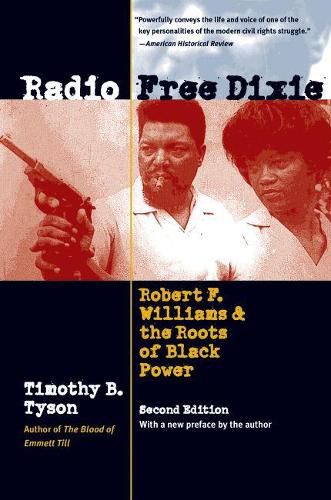Readings Newsletter
Become a Readings Member to make your shopping experience even easier.
Sign in or sign up for free!
You’re not far away from qualifying for FREE standard shipping within Australia
You’ve qualified for FREE standard shipping within Australia
The cart is loading…






This classic book tells the remarkable story of Robert F. Williams (1925-1996), one of the most influential black activists of the generation that toppled Jim Crow and forever altered the arc of American history. In the late 1950s, Williams, as president of the Monroe, North Carolina, branch of the NAACP, and his followers used machine guns, dynamite, and Molotov cocktails to confront Klan terrorists. Advocating
armed self-reliance,
Williams challenged not only white supremacists but also Martin Luther King Jr. and the civil rights establishment. Forced to flee during the 1960s to Cuba-where he broadcast
Radio Free Dixie,
a program of black politics and music that could be heard as far away as Los Angeles and New York City-and then to China, Williams remained a controversial figure for the rest of his life.
Radio Free Dixie reveals that nonviolent civil rights protest and armed resistance movements grew out of the same soil, confronted the same predicaments, and reflected the same quest for African American freedom. As Robert Williams’s story demonstrates, independent black political action, black cultural pride, and armed self-reliance operated in the South in tension and in tandem with legal efforts and nonviolent protest.
$9.00 standard shipping within Australia
FREE standard shipping within Australia for orders over $100.00
Express & International shipping calculated at checkout
This classic book tells the remarkable story of Robert F. Williams (1925-1996), one of the most influential black activists of the generation that toppled Jim Crow and forever altered the arc of American history. In the late 1950s, Williams, as president of the Monroe, North Carolina, branch of the NAACP, and his followers used machine guns, dynamite, and Molotov cocktails to confront Klan terrorists. Advocating
armed self-reliance,
Williams challenged not only white supremacists but also Martin Luther King Jr. and the civil rights establishment. Forced to flee during the 1960s to Cuba-where he broadcast
Radio Free Dixie,
a program of black politics and music that could be heard as far away as Los Angeles and New York City-and then to China, Williams remained a controversial figure for the rest of his life.
Radio Free Dixie reveals that nonviolent civil rights protest and armed resistance movements grew out of the same soil, confronted the same predicaments, and reflected the same quest for African American freedom. As Robert Williams’s story demonstrates, independent black political action, black cultural pride, and armed self-reliance operated in the South in tension and in tandem with legal efforts and nonviolent protest.